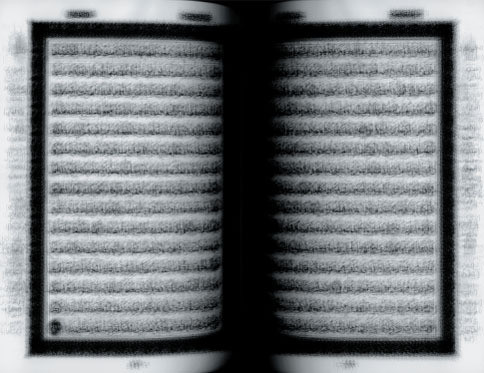
Perhaps it is a reaction to the interactive time we live in—where video games and the Internet create portals to different worlds, where we control the x,y,z—but Beecher’s, in its inaugural issue, has curated, whether they are aware of it or not, a small collection of fiction and poetry that exist in two places: a realm of narrative and that of the participatory game.
The first, striking example of the journal’s interactive nature is the design. That point may seem self evident—you interact with the journal as you would with any other book—but there is something more to Beecher’s. The pages are porous. They absorb dirt, fingerprints, and oil. The binding is loose. When it is in your grasp, you are handling something precious, an antiquity. A person like myself, who believes in the preservation of items, finds that holding the journal, attempting not to damage it, is a thoroughly conscious process.
The journal being physical as opposed to electronic means you can’t click links in Beecher’s as you would in a hyper-text journal. The writing has to works harder to to encourage reader interaction. Here is where the journal begins to push real boundaries.
In Rebecca Wadlinger’s poem, “Mrs. Mayfield and the Museum of Bodies,” the narrator touches statues and paintings in an unnamed museum under the suspicious gaze of a security guard. When the guard blinks, the narrator/poet sneaks a touch. The guard, by the end of the poem, is so worn down by the narrator’s persistence that he allows her to interact with the art, finally, as she truly desires.
Cohen’s “The Rules (Gulf Version),” is a set of game rules which informs the reader that any number of people may participate in the game/narrative, as long as they are human like you and me. But, for practical purposes, the participants in the game must “exceed one”, drawing the reader into the “game.” During my interaction with the story, I was forced to wonder whether I was playing a game with the author, or with the characters of the story. Either way, a dead body became a heavy load at the end of the story, requiring redemption and resuscitation that only I, as the reader and participant in the game, could supply. READ MORE >
 3. Have you experienced “Fire Island Sideshow” by Jon Cotner and Claire Hamilton?
3. Have you experienced “Fire Island Sideshow” by Jon Cotner and Claire Hamilton?






